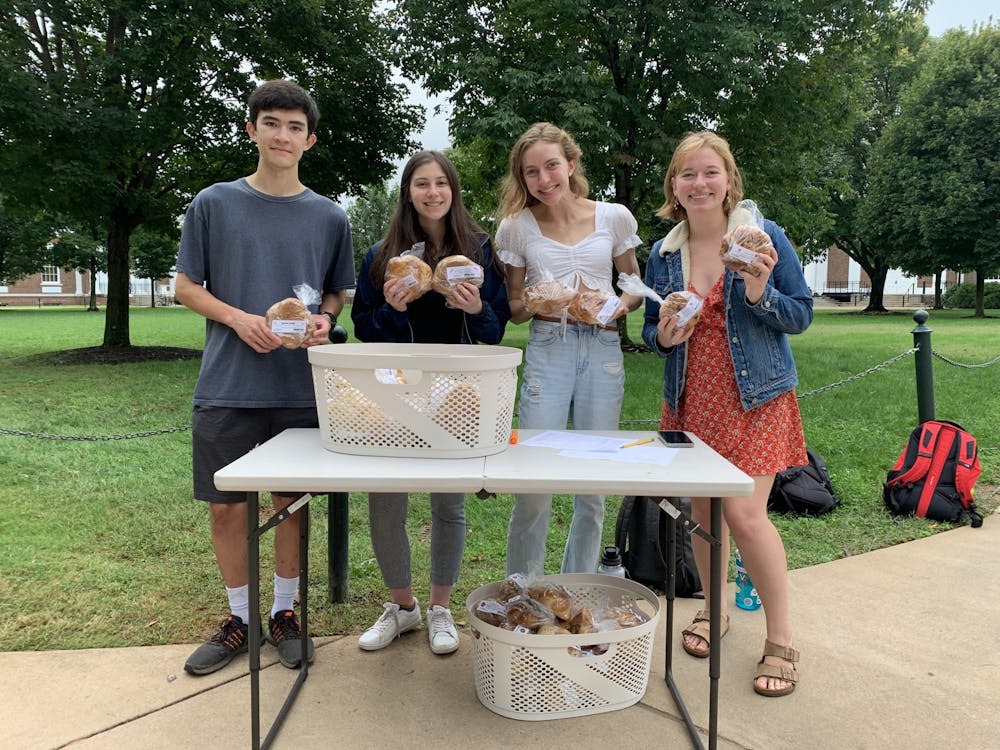Lea en español
Every Thursday from 10 a.m. to 2 p.m., Challah for Hunger sets up shop on the Lawn, selling freshly baked challah bread in a variety of delicious flavors to hungry students trekking to and from classes. Proceeds from each sale are divided evenly between Swipe out Hunger — a national nonprofit that focuses on food insecurity at college campuses — and Blue Ridge Area Food Bank of Charlottesville.
Founded in 2004 at Scripps College by Eli Winkelman, Challah for Hunger has expanded nationally and globally over the past 17 years. The University’s chapter of CfH — established in 2011 — is just one of over 80 chapters belonging to campuses in the U.S., Canada, UK and Australia. The organization seeks to address and combat food insecurity on a local and national level by engaging in activities centered around the challah bread which is native to Jewish tradition.
“[We] care about advocacy and awareness for food insecurity, both in the community and on college campuses. I think people aren't really aware of how many students on college campuses, including U.Va., are food insecure,” said Sydney Levy, second-year College student and weekly sales chair. “[We want to] share this through the Jewish lens of baking challah and sharing our culture with people.”
Getting challah into the hands of University students and community members is a three-day long process. With dough-covered hands and flour-dusted aprons, members of CfH and nonmember volunteers unite to make the challah dough every Tuesday at 4 p.m. at the Brody Jewish Center. The dough is then braided and baked on Wednesdays at 4 p.m. Challah sales take place Thursdays on South Lawn, but the group also sells loaves at Congregation Beth Israel — located just outside Downtown — on Wednesday evenings.
With reduced COVID-19 restrictions, Challah for Hunger is able to return to its normal operations this semester. Unlike previous years, the executives and volunteers are required to be vaccinated and wear masks.
The CIO accepts challah pre-orders through Monday night and makes extra loaves in anticipation of eager Thursday walkups. While the group primarily makes sales on the Lawn and at Congregation Beth Israel, there are other opportunities to sell challah.
“We also have special sales,” said AJ Eustace, third-year College student and vice president of sales. “A few weeks ago we did a special sale by the old dorms, where we made miniature challahs, and we sold those in front of O’Hill.”
In a normal week without special sales, challah sales average between $300 to $350. Flavored loaves are sold for $4 and plain loaves are sold for $3. Staple flavors include plain, chocolate chip, cinnamon sugar and garlic rosemary along with a special flavor that varies each week. This past week’s special was everything bagel. The members are constantly in search of new flavors to add to the mix, unconstrained since all of CfH’s recipes are their own.
“Once every December we do a taste test event,” said Eden Olsberg, fourth-year College student and special sales coordinator. “We try [the flavors and] decide which are going to be added to the rotation for the next semester and next year. It's really fun and you get to be really creative.”
The CIO, composed of an 11-person executive board, also opens the challah-making process up to nonmember volunteers with no need to sign up in advance. Word spreads primarily through their Instagram @challahatuva.
First-year College student Mary Ellen Schuster volunteered a few hours of her time this past Tuesday to help make the dough.
“I found out [about Challah for Hunger] through their Instagram first,” Schuster said. “I love baking, and I love challah, so I was like, ‘Oh, I'll try that out.’ I went the first week. I did dough baking and it was a lot of fun.”
In addition to participating in the production process, nonmembers can get involved in other ways. Most Challah members start out as dorm representatives in their first year, educating their fellow residents about Challah for Hunger and its hunger-relief mission. During the spring semester – typically in April – applications and interviews for executive positions take place.
The pandemic brought its fair share of challenges to the CIO. Prior to the pandemic, the group produced an average of 150 loaves per week. This year they are committed to reaching this number again through the help of volunteers.
“Last year was really different because we could not be physically here at all,” said Nicole Ralsgard, fourth-year College student and president. “Instead of buying the challah bread, we came up with a cookbook, and we sold the cookbook. And then we started selling a baking kit together with the cookbook, so you could [bake challah] back home.”
Despite the hindrances of the coronavirus pandemic, Challah for Hunger managed to raise over $1000 for the Blue Ridge Area Food Bank last year through their challah kit and cookbook sales along with an Instagram story bingo fundraiser. This year, the club faces adjustment pains coming out of the remote year.
“Only a handful of us on [the executive team] were in Challah pre-pandemic [and] know how the actual operations are supposed to work,” Olsberg said. “It has just involved those of us who have been here from the beginning stepping up a bit more, which we're all happy to do for an organization that we love.”
In the future, Challah for Hunger hopes to combine their usual operations with some of their pandemic practices. This includes resuming cookbook sales and increased social media and education campaigns. Regardless of the changes in logistics, Levy confirmed that advocacy and raising awareness for food insecurity, as well as sharing Jewish culture through challah, remains at the forefront of their mission.
“People aren't really aware of how many students on college campuses, including U.Va., are food insecure,” Levy said. “Another part of it is wanting to share this through the Jewish lens of baking challah and sharing our culture with people so … teaching about food insecurity through this Jewish organization [is] our mission.”







